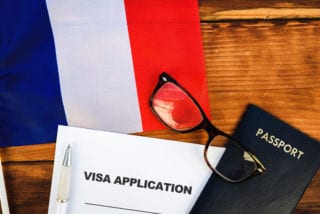 What Expats Should Know About France’s Work Visa
What Expats Should Know About France’s Work Visa
France is one of the most visited countries in the world. Unsurprisingly, more than a few visitors fall in love with the country and vow to return and settle down. Many more are attracted by France’s diverse work opportunities and strong life-work balance. Additionally, quite a few make the move in order to be close to friends and family. But no matter what motivates them, these would-be expats all have one thing in common. They need to figure out what work visas in France are right for them.
Who Needs a Work Permit in France
Some would-be expats interested in working in France will be happy to know that they don’t need a visa. If you’re a citizen of the European Union, Norway, Iceland, Liechtenstein, or Switzerland, you don’t require a permit to work or live in France.
Additionally, if you already have a residency permit for France, you may not need a separate work visa. Check what kind of residency you have. Your residency card should specify if your stay is permanent, provisional, or short. Those who carry a permanent residency card most likely have the right to work (though you should confirm with local authorities.) Alas, the other residency categories most likely require a separate work permit.
For everyone else hoping to work in France, you need a work visa.
First Steps to Obtaining a Visa
In many ways, getting a visa is the easy part. The tricky part is getting a job! However, it’s a necessity for nearly every visa. When you’re offered a job, your employer applies for a work visa on your behalf. As such, you work together to submit the paperwork required by the Ministry of Labour. Once everything has been processed at the regional ministry office, the file transfers to federal immigration authorities. They contact the French embassy in your home country. At that point, it’s your responsibility to visit the embassy in person and complete the application.
What Visa Is Right for You?
Identifying what work visa you need isn’t necessarily a straightforward process. Much depends on what kind of work you intend to do, your country of origin, and how long you intend to stay in France. Thankfully, there’s a good resource to help you with the process. The France-Visas website is run by the French government. It helps you narrow down options based on your particular circumstances.
In most cases, the nitty-gritty of figuring out which visa to choose falls to your future employer. However, it’s still helpful to explore the site. There may be more options for moving to France than you initially imagined!
Options for Temporary and Seasonal Workers
Not everyone working in France intends to stay in the country long term. In general, those taking up short-term jobs find that getting the correct papers is pretty straightforward. If you plan to work for less than three months, your employer can apply to the Ministery of Labour on your behalf as a temporary worker. Additionally, in some cases, this requirement is waived depending on your nationality.
Seasonal visas are different from temporary worker visas. They are often utilized by agricultural and hospitality workers and allow for six months of work out of every twelve. There’s an option to renew several times, depending on need.
Working Holidays and Au Pair Programs
If you’re a new graduate, keen to explore France, and eager to improve your language skills, it’s well worth looking into the special programs that exist for working holiday participants and au pairs.
To work in France under the au pair program, you must be under 30 years old and have a demonstrated commitment to learning French. The family you’ll be working for makes the visa application on your behalf.
However, if you want to work in a field other than childcare, a working holiday program is a good fit. It generally allows multiple entries to France, which is nice for backpackers who like exploring further afield on their days off. Additionally, it allows applicants to come to France first and then seek a job (often in the tourism or hospitality industries). When you land a job, you complete further paperwork. The idea behind working holiday programs is that applicants are in France for travel and leisure first and their employment comes second.
How Long Does it Take to Get a Visa in France?
Just how long does the entire process take? That depends! It takes anywhere from three weeks to nearly three months to complete the process. Much of it is out of your hands entirely. For instance, your timing could depend on your local embassy, how busy they are, and how efficiently the staff work. However, you cannot start the application process any more than three months before you intend to travel. As such, even if you’re extremely organized, you can only do so much.
Paperwork Needed for a French Visa
If there’s one thing that visa applications have in common the world over, it’s paperwork. France is no exception. While exact requirements vary depending on the circumstances, in general, would-be expats should anticipate preparing the following:
- A valid passport. Your passport must remain valid beyond the length of your visa term.
- Completed application and residence forms. Don’t forget to sign it!
- Two passport-sized photos.
- Evidence of your travel plans, such as your pre-booked return flight, depending on the applicable visa term.
- The application fee and, in some cases, a stamped and self-addressed envelope.
Additionally, if you’re applying for certain visas, you’ll be asked to provide additional information and documentation. This commonly applies to the “skills and talents” visa. Applicants must demonstrate their skills and qualifications. For example, resumes, degrees and certifications, and even samples of your work are commonly requested.
If family members accompany you overseas, they must come to embassy appointments with you. Some visas require fingerprints and photographs completed at the embassy.
Do I Need Insurance with a France Work Visa?
The short answer is yes you will need insurance if you plan to travel to France. It is mandatory and must cover medical repatriation, and emergency and/or hospital treatment.
How Much Does a French Work Visa Cost?
How much you pay for your visa depends on where you live and what kind of visa you need. In general, you should expect to pay at least $100 and prices increase from there.
Visa Alternatives: The Blue Card
Sometimes the best solution to your French visa quandaries isn’t a French visa at all. Depending on your work, an EU Blue Card might be a better fit. This special visa, often called Europe’s answer to the US Green Card, entitles holders to work across the EU, excluding Denmark, Ireland, and the United Kingdom.
Blue Card applicants must be non-EU citizens. The program, designed for highly skilled workers, targets applicants with a university degree or five years of senior professional experience. Additionally, applicants must have a binding job offer or an active work contract. While qualifying is tough, there is a plus side. The application process is fast-tracked by all participating countries. While processing times aren’t guaranteed, applicants are reassured that the process proceeds reasonably quickly.
Related:

